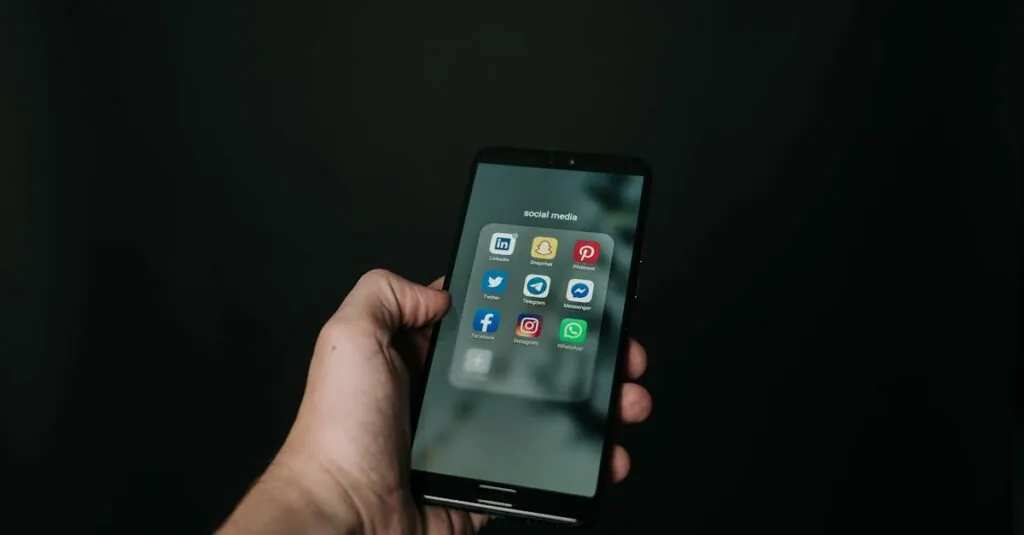Table of Contents
ToggleIn today’s fast-paced world, mobile apps have become the trusty sidekicks for students navigating university life. Imagine having all your class schedules, grades, and campus events right at your fingertips—no more frantic searches for info or missed deadlines. With the right mobile app, students can transform their chaotic college experience into a well-orchestrated symphony of productivity.
Universities are catching on to this trend, offering apps that not only streamline communication but also add a sprinkle of fun to the academic grind. From tracking assignments to finding the nearest coffee shop on campus, these apps are designed to make life easier and a bit more enjoyable. So why not embrace the tech-savvy revolution? After all, who wouldn’t want to ace their studies while sipping a latte and scrolling through the latest campus happenings?
Overview Of Mobile Apps For Universities
Mobile apps for universities play a crucial role in enhancing the academic experience for students. These applications provide a centralized platform where students can access important information, such as class schedules and grades. A variety of features help streamline communication between students and faculty, promoting a more connected campus community.
Universities focus on developing apps that cater specifically to the needs of their student populations. Features typically include notifications about campus events, deadlines, and emergency alerts. Accessing library resources and course materials becomes simpler through these tools, ensuring students stay informed and engaged.
Customization is another key advantage of mobile apps. Personalization options allow students to tailor their experiences, selecting the information that matters most to them. Many apps incorporate social features, encouraging interaction among students and enhancing the sense of belonging within the university community.
Data suggests that mobile app usage is rising at a rapid pace, with over 70% of students reporting their utilization in daily academic activities. Universities benefit from increased engagement and improved satisfaction rates as students engage more deeply with their education.
Security remains a priority for universities developing these apps. Enhanced security measures protect personal information while ensuring a seamless user experience. By prioritizing student welfare and academic success, mobile apps for universities serve as invaluable resources in today’s tech-driven educational landscape.
Features To Look For In University Apps
University apps must prioritize features that enhance user engagement and streamline academic tasks. Students seek seamless navigation for optimal usability.
User Interface And Experience
Intuitive design is crucial in university apps. Clarity and simplicity facilitate easy access to vital information. Students prefer visually appealing layouts that foster a positive interaction with the app. Consistent color schemes and accessible fonts contribute to an enjoyable user experience. Responsiveness on various devices, including smartphones and tablets, enhances accessibility, ensuring students can access information anytime, anywhere.
Integration With Existing Systems
Seamless integration with university systems is essential. Apps should connect with existing platforms such as learning management and student information systems. Streamlined access to course schedules, grades, and library resources optimizes usability. Students expect easy synchronization of their personal calendars with campus events. Efficient integration reduces duplication of efforts and improves overall functionality, allowing students to manage their academic responsibilities effectively.
Communication Tools
Effective communication tools elevate the student experience. In-app messaging and notifications keep students informed about important updates and events. Status updates on assignments and deadlines enhance accountability. Additionally, forums or chat features encourage collaboration among students and faculty, building community and enhancing engagement. Prioritizing these tools promotes a sense of belonging within the university environment and fosters stronger relationships between students and the institution.
Popular Mobile Apps For Universities
Universities globally embrace mobile apps to enhance student experiences. Many apps cater specifically to academic needs, supporting communication and providing essential resources.
App A
Blackboard offers an integrated platform for students to access course materials, grades, and assignments. Users engage with their instructors through in-app messaging, which facilitates real-time communication. Notifications alert students to important deadlines and announcements, promoting academic responsibility. Its user-friendly interface ensures easy navigation, contributing to increased user satisfaction. Over 80% of students report that Blackboard optimizes their academic engagement, making it an invaluable tool for daily management.
App B
Canvas stands out for its customizable dashboard, allowing students to tailor their view based on personal preferences. The app supports course participation through discussions and assignments, enhancing collaborative learning. Readily available resources streamline access to library materials and academic support. Students recognize its ease of use, favoring the visual displays and responsive design. With a growing user base, Canvas continues to enhance academic experiences, reported by over 75% of users who appreciate its effectiveness.
App C
Evernote serves as an essential note-taking tool for students, offering organizational skills crucial for academic success. With capabilities to create to-do lists, capture lectures, and store resources, the app promotes efficient study habits. Users can sync their notes across devices, ensuring access anytime and anywhere. Many appreciate its integrations with other productivity apps, which streamline workflow. Approximately 70% of students find Evernote aids in managing their time and tasks, proving its effectiveness in academic settings.
Benefits Of Using Mobile Apps In Higher Education
Mobile apps significantly enhance university life. They foster a more connected and efficient academic environment.
Enhanced Engagement
Mobile apps increase student engagement by providing interactive features. In-app notifications about events and deadlines capture students’ attention, prompting participation. Social tools within these apps encourage collaboration among peers, building a sense of community. Users of these platforms report higher levels of satisfaction, with over 70% engaging more deeply with content. Tracking participation in campus activities also becomes easier, helping universities understand student interests. By offering gamified elements, such as reward systems for attending events, apps motivate students to stay active on campus as well.
Improved Accessibility
Mobile apps improve accessibility for all students. Students can access essential resources anytime and anywhere, making academic tasks simpler. Course materials, grades, and schedules are a few taps away, eliminating the need to navigate complex systems. For students with disabilities, these apps often include features that enhance usability. Customization options allow students to tailor their experience, enabling them to prioritize different aspects of their education. Additionally, real-time announcements ensure that users stay informed during emergencies or schedule changes. Research shows that students utilizing mobile apps experience increased academic success, highlighting their importance in today’s educational landscape.
Challenges In Implementing Mobile Apps
Implementing mobile apps in universities presents several challenges that require careful consideration.
Adoption Rates
Adoption rates for mobile apps in universities vary significantly. Despite over 70% of students utilizing these apps in academic settings, some institutions struggle with low acceptance among faculty and staff. Faculty resistance often stems from concerns over technology adaptation and workload implications. Ensuring that both students and educators embrace these tools proves essential for successful implementation. Universities face the need for continuous training programs, enabling faculty to realize the benefits of integrated communication and streamlined academic management. Moreover, the disparity in technological proficiency among students can impede uniform app usage, necessitating tailored approaches to address diverse user capabilities.
Technical Issues
Technical issues often hinder mobile app effectiveness in universities. Stability and performance of the apps rank as primary concerns for students and faculty alike. Challenges with software integration into existing university systems can disrupt the user experience and reduce overall engagement. App developers face the need to prioritize improved server performance and regular updates to maintain functionality. Security vulnerabilities also pose significant threats, as safeguarding personal information constitutes a crucial priority. Enhancing cybersecurity measures not only protects users but also fosters confidence in app utilization among the university community. Addressing these technical challenges ensures a seamless experience that supports academic success and promotes widespread adoption.
Mobile apps are transforming the university experience by streamlining access to essential resources and enhancing communication. As more institutions recognize their value, the focus on developing user-friendly applications tailored to student needs is becoming increasingly important.
These tools not only foster academic engagement but also create a sense of community among students. With features designed for personalization and real-time updates, mobile apps are proving to be indispensable in today’s educational landscape.
While challenges remain in their implementation, the benefits far outweigh the hurdles. As universities continue to innovate and adapt, mobile apps will undoubtedly play a pivotal role in shaping the future of higher education.



